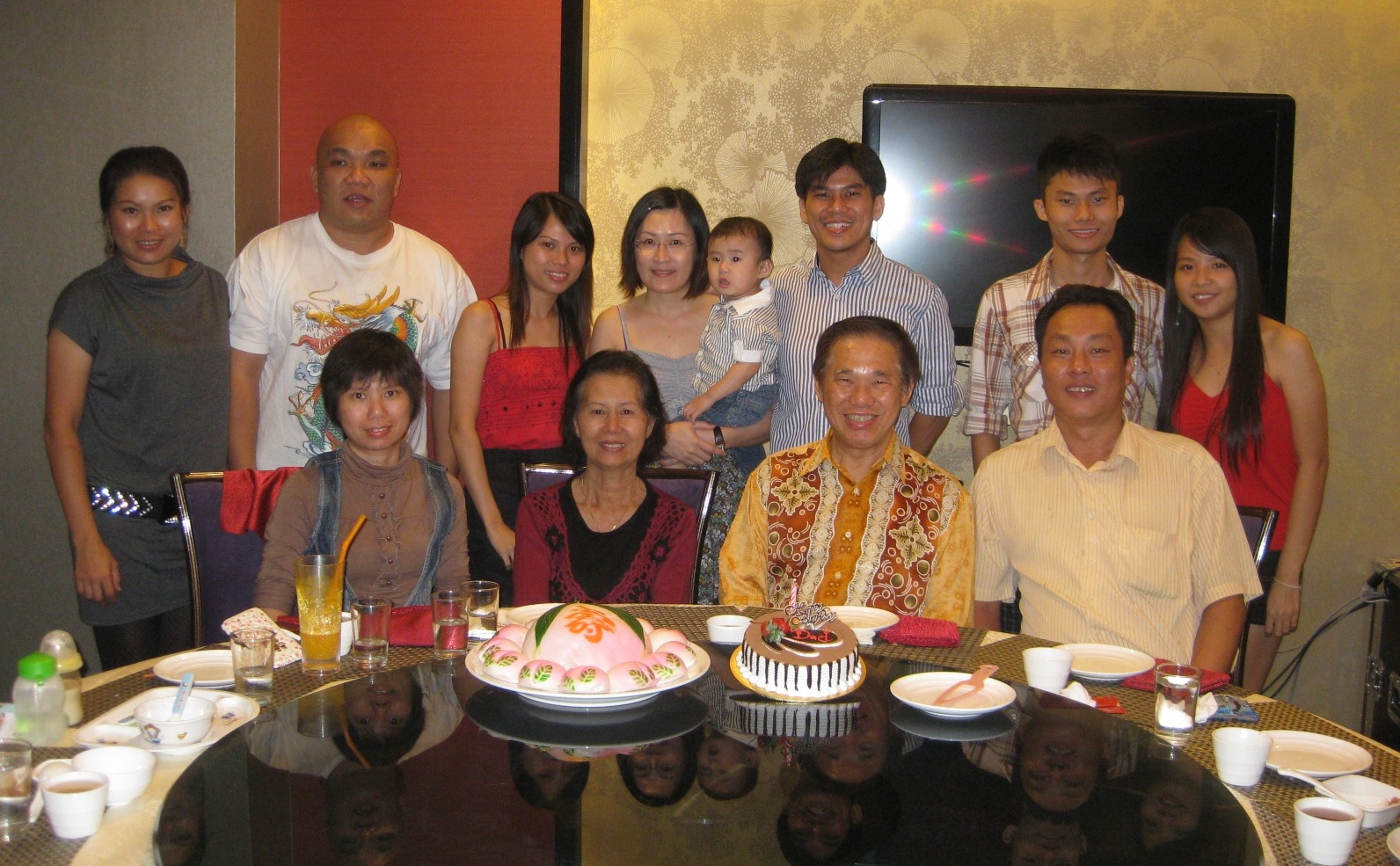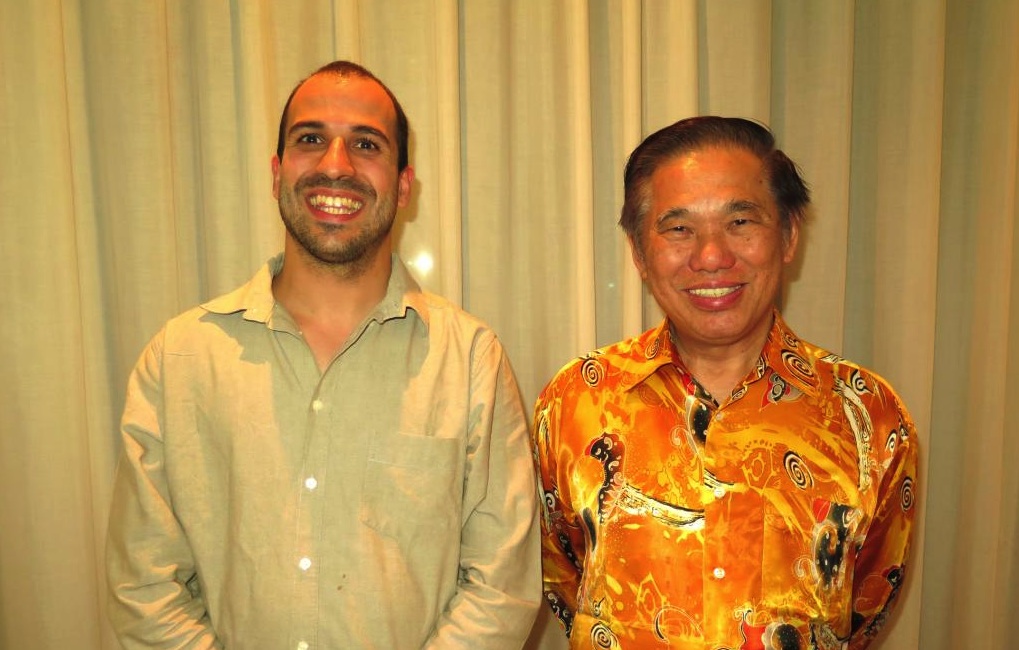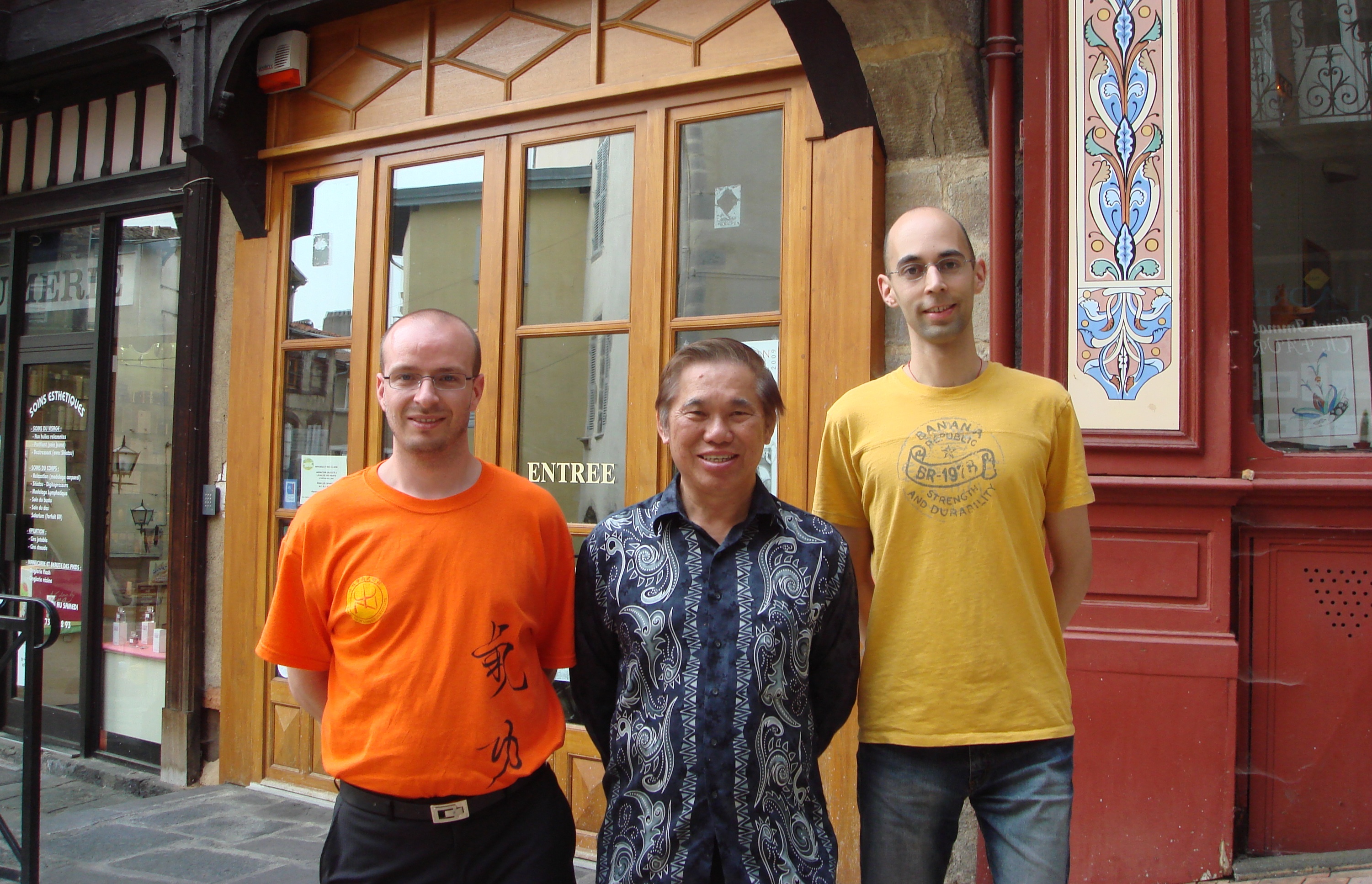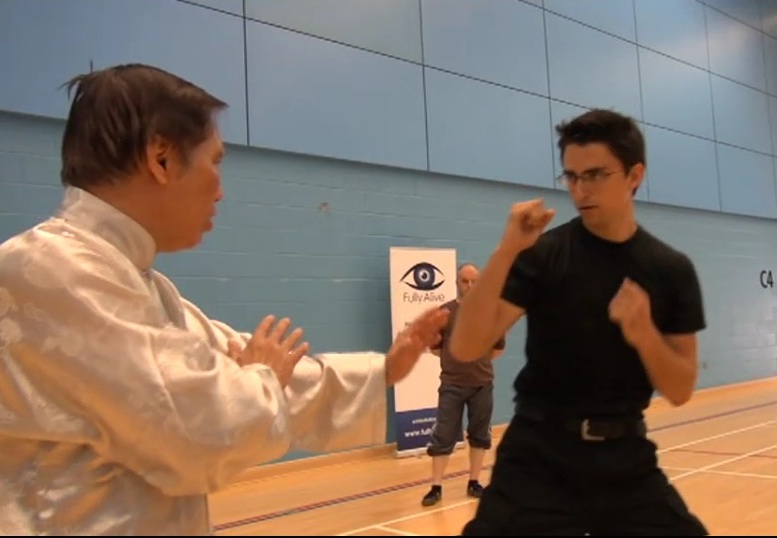SELECTION OF QUESTIONS AND ANSWERS
FEBRUARY 2015 PART 3

Happy Family
Question 1
Sifu, our school is noted for happy family life, and you are a shining example. What in your experience is the most important factor that makes a family happy and united?
— Sifu Maxime Citerne, France
Answer
In my experience the most important factor that makes my family happy and united is our regular family day. We have our family day at least once a month, usually once a week. If I include dinners together at restaurants as family days, it will be a few times every week when I am not teaching overseas.
In our typical family day, we will all get into my comfortable multi-purpose vehicle, which can seat seven persons, and drive to the countryside or some towns far away. We would stock the car with drinks and tit-bits for our pleasure. There are three main activities in the car -- chatting, admiring the scenery or taking a nap. The scenery never fails to captivate me although I have seen it many times in my domestic travels.
One particular scene I remembered very well was in a rural area about 50 kilometers away from Sungai Petani where I live. I saw an open field with porcelain cranes. When we approached I realized there were real. One of them decided to soar into the sky! I saw this lovely scene more than 20 years ago with my wife and children when my wife was beautiful and my children still small.
I had wanted to see the scene again with the porcelain-looking cranes, but could not find it because the first time we ventured into it was by chance. But recently during a family outing we came to the same scene again with the porcelain-looking cranes, also by chance. My wife is still very beautiful but my children have grown up and are married. This time my grandson, Rowan, was with us. I even thought that the cranes could be the same.
We eat out very often, partly because restaurant food in Malaysia is delicious and cheap, and mainly because it offers a good opportunity for the family to be happily together. Again there is a lot of talking, but no napping. There is also no playing of computer games on one's mobile phone, a feature, unfortunately, that is very common in other family gatherings.
A few times when I took my wife out, we were initially surprised but later amused to find many young couples dropping their heads to play computer games on their individual mobile phones, instead of holding hands or at least chatting with each other. There should be a rule, enforced by authorities if necessary, that no courting couples or family members in a family gathering can play games on their mobile phones! This rule, if there is one, would not affect my wife and me, for despite being married for over 40 years, we found ourselves busy chatting on unimportant things.
Question 2
Monks were supposed to be happy and free, but some of them were involved in temple politics and quarreled amongst themselves. This also happens in today's organizations dedicated to noble work. What is your opinion?
Answer
What you have said is true. Ideally, monks should be happy and free, but in practice many of them were not. Some people may be surprised. They imagine, erroneously, that monks had reached the highest level of spiritual development and were waiting for Enlightenment.
In reality, in China in the past, poor family sent their children to temples to be monks so that they could have two meals to eat. Criminals escaped to temples to be monks, for there was an imperial degree that once a criminal became a monk the law would not go after him. Many of these monks were bitterly involved in temple politics.
A similar situation exists in organizations today, even when these organizations are dedicated to noble causes, though parents today do not send their children to the organizations to be fed, nor criminals took refuge in the organizations to escape from law. Some office-bearers are more concerned with securing their positions in the organizations than promoting their noble causes. This was a main reason why I chose to run our school on a sole-proprietor basic rather than on an association basic. You can read some of my interesting experiences with organizations in my autobiography.
As a world organization based on a sole-proprietor basis and not on a committee-elected association basis, our school, Shaolin Wahnam, is doing very well. There may be differences amongst some senior members of our school, which is quite inevitable in a world organization of our size, but these differences are due to different perspectives and not on personal greed or power struggle.
A brief example may make this issue clearer, and is beneficial for our family members to know. Team A in our school may want to teach our arts in a certain way. Team B may feel that the actions of Team A are against the policies of our school. This is a perspective of Team B. In reality Team A may not have this intention.
It is significant to note that both Team A and Team B have the interest of our school at heart, but they see the same reality from two different perspectives. If our school were based on a committee-elected association basic, this disagreement may lead to a break-up of the association. Luckily our school is based on a sole-proprietor basis where I as the Grandmaster have the final say. And luckily I have the wisdom to see beyond their limited perspective. By explaining the situation to both teams, we keep our school intact, and progressing.

Being happy is a characteristic of our school
Question 3
I have a personal opinion and would like to have your comments. Years ago, before I learned from Sifu, I attended some spiritual retreats. Participants were not allowed to talk to one another. The teachers led retreat participants to chant mantras wishing all beings be happy and safe. But the way the teachers chanted the mantra was so depressing that it made the participants dull and sleepy. Do you think this would have a reverse effect? I also found the teachers close.
Answer
I agree with your opinion.
The organizers of the retreats, despite their good intentions, failed to realize the different aspirations of participants who attended the retreats and the aspirations of monks in monastery upon which the retreats derived their model.
Monks in monasteries had renounced their worldly life and devoted themselves sole-heartedly to attain Enlightenment, or return to God the Holly Spirit. Participants at the retreats were not monks. They did not want to renounce their worldly life. They were not ready to return to God yet, though they might eventually. All they wanted was some meaningful training, preferably with some fun, to enable them to enhance their worldly life.
For monks, closing their mouth and not talking to anyone was a good way to detach themselves from worldly life. They did not want to have any relationship with anybody, or to have any emotions, not even noble ones. If they are kind, for example, their kindness will attach them to the phenomenal realm, and they will be unable to attain Enlightenment.
These aspirations, noble in themselves, are not suitable to retreat practitioners, who were laypersons. By closing their mouths, or not speaking to others even when their mouth is open when they keep quiet, they pent up their emotions, which is bad for their physical, emotional, mental and spiritual health.
The effect of non-verbal communication is often more important than verbal communication. Depending on how you say the following words to a friend, "I hope you're well", you may mean you hope he is well, you sense he will soon be in trouble, he is in trouble already, he is unwell, you are giving him a serious warning, or many other things.
Hence, although the dictionary meaning of the words coming from the mouth of the teachers indicate their desire for all beings to be happy and well, the way they say it may bring an adverse effect. The adverse effect may not necessarily be that those beings wished by the teachers would be sad and unwell, but the participants following the chanting of the teachers may become dull and gloomy.
Indeed the feeling behind a mantra is often more important than the dictionary meaning of the mantra itself. Many mantras are chanted in Sanskrit, which the cultivators chanting the mantras do not understand. Yet the mantras bring desirable results. It is because of the strong feeling the cultivators have when chanting.
Question 4
I do feel with you. You can't judge someone on hearsay. You must be careful with bringing up issues like this, for people are traumatized. It is better to let go of trauma than cling to it. But that is in no way an explanation for me why you don't seem to want to know what really happened. Are you planning on doing that? Why haven't you already?
— Name and Country Withheld
Editorial Note: This is a continuation of the questions asked in the previous issue of the Question-Answer Series. The enquirer's other questions can be found at the next issue of this Question-Answer Series.
Answer
You are right in your first observation that it is better to let go of trauma than cling to it, but wrong in your second observation that I don't want to know what really happened.
I was very surprised that both Anthony Korahais and Rama Roberto were sick when both of them were high-level practitioners of kungfu and chi kung, and had helped others recovered from so-called incurable diseases. A possible cause of their sickness was that they could not let go.
I investigated the matter as best as I could. Many people may not realize it because I did so quietly instead of making a fanfare of it, both because it was more effective and also it did not traumatize victims. My conclusion was that the accusations were not like what fiery accusers painted them to be as rapes and sexual assaults. The accused did not force women into sex though some of them regretted the relationship later on. Some even thought, wrongly, that having sex with a master was normal. This resulted in a statement stating that we in Shaolin Wahnam do not condone any sexual abuse.
Nevertheless, if the process of finding out what happened would result in harm rather than good, I would not stubbornly continue. This is wisdom over curiosity.
Let us take a hypothetical example. Suppose the accused had extra-marital sex with the wife of the president of a company, and both of them were happy in their relationship. I would not persist in finding out who this woman was, as it might jeopardize her relationship with her husband and the reputation of the company.
Yes, I would continue doing what I did. All I have done is based on high moral values, a clear conscience and a courageous sense of righteousness. If this case repeated itself, I would have done the same things. I would prefer to lose some instructors, including two who renounced me as their sifu, and subject myself to false allegations that I condoned sexual abuse (though I did not commit the abuse as some people might have been wrongly misled to believe) than to denounce a student whom I regarded as a son, based on accusations yet to be proven.
Your question as to why I haven't investigated into the matter, becomes irrelevant. We investigated into the matter, and as in all other matters we did so with high moral values, like forgiveness and compassion, a clear conscious, and a courageous sense of righteousness. In this case, for example, forgiveness and compassion have been guiding principles in our handling of the matter, our conscience is clear that we do our best to protect our students, and we need courage to face false allegations.
I regard those fiery accusers in this case hold different moral values. They considered indignation and justice even when accusations had not been proven to be more important than forgiveness and compassion. They were not clear in their conscience that by publicizing the issue would bring traumatic pains to victims. They had courage but were not right in their action as it brought more harm than good.

Praticing our arts gives us good health and vitality
Question 5
For me -- and this is personal again -- it is of extreme importance to know that the school I chose to be a part of, the teachers that are highly recommended to me by this school, are trustworthy.
I would want to know that you to make sure that no harm is done, and if someone slips through the mazes of morality, you make sure I will not be exposed to this person anymore.
Answer
It is not just important for you personally, but important for every student in any school that the teachers are trustworthy.
There are two dimensions in teachers being trustworthy -- professionally and morally. They must be trustworthy in teaching genuine arts, and they must be trustworthy in their character.
Many martial art students, for example, subject themselves to being punched and kicked, and their injuries are routinely unattended to. Their teachers are not trustworthy in teaching arts of self-sefence.
Some students, especially in Western societies, wrongly think that having sex with their teachers for empowerment or other reasons, is normal. Their teachers are not trustworthy morally.
Certainly I make sure that no harm is done to any of our students. If some slips through the mazes of morality, I shall certainly make sure that our students will not be exposed to this person.
The accused person in this case, even when the accusations have not been proven, has voluntarily resigned. Other instructors who hold different values from those of our schools have also resigned.
Question 6
Why have a moral code of conduct at all, if when I get raped the school doesn't takes this seriously, and all I am told is to practice forgiveness?
Why have a moral code when nothing is done to properly investigate if someone is rudely breaking them?
Answer
Not only we have a moral code, we practice it in our daily life.
If you were raped by an instructor in our school, we shall certainly take it seriously. We shall probably report the rape to the police unless if you object to its inevitable publicity. But we shall certainly expel the instructor.
It becomes a mockery to have a moral code when nothing is done to properly investigate if someone is rudely breaking it. But if you were referring to this case in our school your statement is wrong. We did properly investigate, and the evidence suggested that the accused did not rudely break the moral code.

An important aim of practicing kungfu is not to be hit at all, certainly not to endure punches and kicks
Question 7
I do have a problem with the fact that where Anthony states "I heard her tell Sifu Wong that she was sexually abused by her sifu, Gary. I heard her say that she didn't want it to happen", you use the phrase "sexual relations she regretted". This really sounds fishy to me. But again, I can't tell who is right. I would have to ask the woman who was there with you and told you the story.
Answer
Don't do this. You may cause great harm to her.
I can't remember what exactly was said. But I can clearly remember that my main concern at the meeting was to help her overcome her trauma. Using a phrase like "sexual relation she regretted" would be more helpful than "sexually abused". There is nothing fishy about it.
What good can you get by asking her? You only satisfy your curiosity. You won't prevent other women from being sexually abused. But you are likely to cause traumatic pain in her, and probably to other victims too if your self-satisfying investigation is extended.
It is like the smear campaigns against us. Not only the allegations are not true, for which please see my Statement on Accusations and Allegations of Sexual Abuse, these smear campaigns bring traumatic pains to alleged victims and exposure risks to women who do not want their relationships made public. Worse, it steers away people whom we can help.
Angeline, a victim of sexual abuse, said succinctly, "Sifu has the capacity to help those affected to heal, recover, lead a happy life and experience spiritual joy in an amazing short period of time. And yet you steer people away from him. This saddens me deeply. For I do not believe you have this ability." Please see Sifu's Teaching and My Chi Kung Practice Helped Me Heal.
I am always hesitant to mention her in my various replies to questions, like yours here. But often I have to mention her.
She told me that she was much traumatized by Anthony Korahais's publicity. She is still in our school, and she is now happy.
Question 8
Do you think rape is not a crime worth prosecuting? Or do you think the victims actually wanted something sexual to happen, but later regretted it?
Answer
Frankly I find your questions very odd. It is not so much due to the difference of our cultural background as you have suggested, but I believe you have been negatively influenced by smear campaigns. But I shall answer your questions straightforwardly.
Of course, rape is not only a crime worth prosecuting, but it should be prosecuted. In my opinion, the present legal system is favorable towards the accused, making conviction difficult, and often embarrassing for the victim. This is due to the Western principle, which is very admirable by itself, that no one should be convicted wrongly.
No, I categorically don't think rape victims wanted something sexual to happen and later regretted it. Many victims were plain or even children. Even if a victim dresses sexily, it is certainly not because she wants to be raped.
Question 9
How are women looked upon in Shaolin and Chinese tradition?
Answer
In the past women were considered inferior to men, not just in Chinese society but all over the world. In Greece, for example, the birth-place of democracy, women and slaves were not allowed to vote.
In Shaolin tradition, men and women were, and are, considered equal but not the same. In our school, for example, men arrange tables and chairs, carry heavy weights and open doors, not because they think women are incapable but because they respect women.
LINKS
Selected Reading
- Lineage of Shaolin Wahnam
- Taijiquan for Health, Combat and Spiritual Cultivation
- Dragon Force and its Effects
- Throw Ball in Waves
- Handling Kick-Boxers and Muay Thai Fighters
